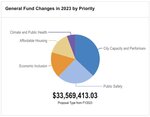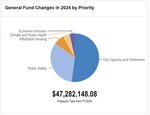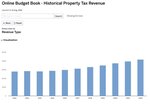By Cam Gordon
There is still time to comment on the city of Minneapolis 2024 budget before it is approved in early December.
Council members will be drafting amendments this month, and their last chance to amend the budget will be after the public hearing on Dec. 5 when the final council vote is expected to be taken.
The process started last August when Mayor Jacob Frey presented his recommended $1.8 billion budget with a proposed 6.2% property tax levy increase and about $48 million dollars of new spending. Since then and the city council has held 18 budget committee meetings to hear highlights and discuss budget details with staff from each department.
So far, 69 people spoke at the two public hearings held on Oct. 25 and Nov. 1. Unlike other years, few people spoke about rising property taxes or the police budget, although one person called for paying police officers more.
Several others spoke about paying public works employees more, including Scott Yahr who lives in Whittier and is a city worker with the Laborers International Union of North America Local 363 labor union.
“We put our lives on the line every day, whether it be in a tunnel 100 feet below the surface of downtown, or a construction ditch, or the perils of traffic in the middle of the street,” said Yahr. “We work during the pandemic, civil unrest, adverse weather conditions and the unique challenges of working with the unfortunate unhoused residents of this fair city.”
Yahr ended his comments by asking the mayor and council members to “look at the data our union will provide to understand just how underpaid we are” during the coming contract negotiations.
Funding for addressing the climate crisis, and for enforcing worker protection ordinances accounted for roughly half of all the comments made at the two hearings.
Alex Aliolo and Kawai Washburn, who both live in southwest’s Armatage neighborhood, joined others in calling for more work to address the climate crisis.
“I applaud the council’s recent passage of the $10 million budget for the Minneapolis Climate Equity Plan,” said Aliolo at the October hearing. “However, I fear that renters like myself will be left behind by the actual implementation of this plan. A truly equitable climate action plan must ensure that every home and every person benefit from the plan.”
“I am here to request that any programs developed as part of the climate legacy initiative be designed to support block by block full decarbonization, not just weatherization, but the elimination of oil, gas and fossil fuel infrastructure in the homes and small businesses through union-supported contractors and prioritizing Green Zones and low-income neighborhoods where pollution is the highest,” said Washburn.
Lee Samuelson, Energy Democracy staff with Community Power and a Standish resident, called on the city to form a community governance board to help guide spending that he wants used for a geothermal network feasibility study and pilot. Plus, he’d like to see a neighborhood electrification program that might include replacing gas appliances and installing solar rooftop panels.
WORKER PROTECTIONS
The second largest number of comments concerned worker protections and included speakers from the New Justice Project, CTUL and the Restaurant Opportunity Center of Minnesota. They asked for better enforcement and $225,000 a year to continue 2023 contracts to provide worker education and co-enforcement services for the city. Several workers spoke about how they were helped by these groups to get fair wages, and how more workers could benefit from more money for enforcement and education related to the city’s worker protection ordinances.
OPEN STREETS
Opinions were more varied about the Open Streets events that were not funded in the mayor’s proposal.
“I represent 74 businesses on Lyndale. We pay $5.1 million dollars in property taxes alone,” said Andrea Cobin of the Flower Bar on Lyndale Ave. “We applaud the city for not renewing the contract for Our Streets. Please continue to do the right thing and not fund a lobby group that turns around and lobbies you, the city.”
Last August, after 12 years, the mayor announced that he was ending the partnership with Our Streets. While the city covered logistical costs associated with things including street closures, traffic control and food permits, the city did not provide funding that went directly to the organization.
This followed a request by Our Streets that the city pay $850,000 to fund payroll, equipment, communication, fees to feature local talent, insurance, software, supplies, and printing costs.
Since then, Our Streets, which is a nonprofit advocacy organization dedicated to “making Minneapolis a place where people of all identities and backgrounds have access to streets and trails that are vibrant community spaces year-round,” started a petition that has been signed by over 1,500 people asking the city to reconsider its decision to end the partnership.
Several southwest businesses, including ZRS Fossils and Gifts and the CC Club, as well as the Flower Bar, came in to oppose any city partnership with Our Streets. They also used it as an opportunity to advocate for on-street parking. At least one person was identified as coming from the group called Vibrant Lyndale that says on its website, “Lyndale Ave. S is going through a major reconstruction project, and we are in grave danger of losing our on-street parking by the efforts of lobbyist groups who are being funded by the very city that they lobby.”
“They are actively lobbying elected officials, government employees and the general public to take actions that we believe would likely destroy our businesses and those of our fellow Lyndale commercial Corridor merchants,” said John McArdle of ZRS Fossils and Gifts. “These people have already eviscerated the commercial corridors of Bryant and Hennepin Ave.”
Others clearly support Open Streets. “I have been regular attendee at multiple Open Streets events, done volunteer tabling at Open Streets Broadway,” wrote Skip Schmall in one of many letters of support sent in as part of the public record on the 2024 budget. “These are special events that are valued by neighbors across the city.”
“It brings neighbors, businesses, artists and community organizations together to showcase the diversity and vibrancy of Minneapolis,” wrote Elizabeth Abrahamson from Whittier, noting that it “directly supports the city’s Transportation Action Plan goals and demonstrates what streets can look like when we prioritize people over cars, incentivize multi-modal transportation, and invest in marginalized communities.”
LAKE STREET
Also, of interest to many southwest readers will be the requests of the Lake Street Council (LSC), and the Lake Street Midtown Greenway Partnership for $150,000 to hire a Lake St. public safety coordinator. LSC is also seeking $300,000 to implement Downtown Improvement District-type services in the East Lake Cultural District. These could include an ambassadors program, a communications center, and activation and beautification of public space. They also requested funding for the Law Enforcement Assisted Diversion program to bring case managers to the street, and doubling the allocation for Great Streets programs.
LSC Executive Director Allison Sharkey is hopeful that Ward 9 Council Member Jason Chavez will carry amendments for the safety coordinator and the funding for cultural districts to explore some Downtown Improvement District-type services.
There is still time to weigh in on the budget. You can email city council members, submit comments online at https://fluence-media.co/3Q0ovfp or make them in person at the final public hearing on Tuesday, Dec. 5 starting at 6:05 p.m. Following that hearing, the city council may consider amendments before voting on a final budget to submit for the mayor’s veto or approval.



Comments
No comments on this item Please log in to comment by clicking here